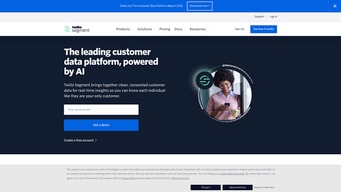

Unclaimed: Are are working at Segment ?
Segment Reviews & Product Details
Segment is a customer data platform that consolidates data from multiple sources to provide real-time insights and enhanced customer profiles. It enables businesses to personalize customer interactions by using AI-driven predictions and recommendations. Segment offers tools and integrations that help streamline data collection, management, and activation for targeted marketing campaigns and customer relationship management.

| Capabilities |
|
|---|---|
| Segment |
|
| Ease of use |
|
| Deployment | Cloud / SaaS / Web-Based |
| Support | 24/7 (Live rep), Email/Help Desk, FAQs/Forum, Knowledge Base |
| Training | Documentation |
| Languages | English |



A few key highlights with Segment: 1. Lots of pre-built integrations to hook into existing customer data sources and destinations 2. Identity resolution capabilities to merge duplicate customers and resolve identities when partial information is available 3. The realtime Profile API enabling personalization of internal products with the rich customer profiles available within the Segment CDP
Although the Protocols add-on looks particularly valuable (provides a way to centralize tracking plans and provide some rigor on what data is entering the CDP), it is priced quite steeply.
Segment CDP enables us to know our customers by enabling the: 1) Data Collection on customer behaviors across all of our products and services 2) Data Aggregation for building a single “Golden” customer profile 3) Data Activation by distributing the customer profile to our warehouse, our products, and our 3rd party systems
- It has improved our data tracking plan - It has improved the accuracy of our data: sending the same data to all tools, something that was previously impossible with 1-to-1 integrations - It has sped up our third party integrations as we no longer need to rely on the development team to do them - Onboarding experience has been the best I've experienced in enterprise software
My only complain is that there's a few minor bugs here and there. Nothing major that hasn't been solved with their tech support.
- Tracking high quality data (with the right naming conventions, and properly coded) and making sure it stays that way. - Then routing this data to other third party tools without relying on our development team
Setting up new data sources and destinations is simple. Managing the flow of data is seamless.
The initial setup of Segment takes a decent amount of dev resources to implement successfully.
Segment helps manage our data by acting as the source of truth and central hub for all customer data.
High-end expierence, interdace is very friendly and you can do so much customizations. Almost every connection I need is there, and many are being added. This saves me and the other developers so many time!
I mostly LOVE using Segment; The singal thing that would improve this is more "cloud-mode" integrations over device mode ones - to save some bloat & loading time on the app. This will also offer even more flexabiliity (to the already great flexability Segment currently provide)
Consulidating all of our integrations in one place; Allow non-technical people to chage logic over different 3rd parties; Save some bloat size of the app; Save time for our developers
The technology has always been impressive, but Segment has managed to iterate and evolve with the challenges and needs many of our clients face. They've been great partners and together we've been able to realize tangible and at bottom-line boosting value for our respective customers.
The downside of Segment is that, like any CDP, you have to be pretty committed to it long term as it will be very entrenched in your digital ecosystem. That's not necessarily a Segment-specific problem, but it is very important that customers (especially those with little knowledge in the space or are less technically sophisticated) understand what they are signing up for (and how to realize value).
Segment helps our clients to remove data silos and get an accurate and high-confidence view of the customer across all touch points. This provides consistency when measuring and reporting on critical KPIs, enables teams to have access to a standard set of data for insight and activation, and saves what would otherwise be a sizeable engineering and infrastructure budget for building this type of capability in-house.
Segment makes building a stream of trustworthy, accessible events and identities for your analytics and marketing tools much easier to achieve and maintain.
Cost can become an issue for companies with significant volumes of anonymous (marketing) traffic.
Segment solves the problem of connecting disparate data sources and data destinations by making it much easier to build data infrastructure that delivers reliable, scalable data.
The primary feature that drew us in was the developer-centric experience. We originally started using Segment many years ago as a client-side analytics aggregator, but when we started investigating the server-side capabilities it really took off for us. We now have better (cleaner) customer data than we've ever had, and by switching to server-side analytics we have a complete picture (no more Cookie acceptance issues). When we switched to server-side it was trivial to build a proof-of-concept to get wider team buy-in. Their API docs replaced two different teams of external "integration partners", and we had a working PoC running in a day. Within a week we had completely switched our integration strategy. Of course the range of destinations is the other killer feature - specifically large enterprise systems like Salesforce, HubSpot which typically require specialists.
In common with a lot of large integration products there is a lot going on within Segment, and you can get lost, but honestly it's nothing compared to bigger, older systems - this is not a reason to not use Segment.
Getting a single view of our customer data, and propagating that data into the external sales and marketing systems that rely on accurate, timely, data. With Segment as the data broker we have a single, simple, server-side integration point that the developers love, and a set of integration tools (mappings) that non-technical users can use to integrate with their tools.
All the documentation, whether it be about events or destinations. In addition, the support (both solutions architect and contact support) is very responsive. Lastly, Segment provides end-to-end functionality and ease of use (integration with destinations, personas tool, and tracking protocols).
Sometimes, the documentation regarding code snippets does not account for more complex coding development and rather only a standard approach to development. Thus, additional technical caveat support would be nice.
Event tracking, destination integration, and engage tool all help us improve the data quality of our core data lake as well as the data we use to make analysis and push marketing campaigns.
It's so convenient to be able to connect new tools to our development environment without having to ping our development team to connect. It saves us so much time to set up and it's very easy to configure going forward. It's just a no-brainer to set up.
I wish Segment had a cheaper plan for startups but I do think it's still fairly priced.
We need to connect our user data from our developer environment to tools like Amplitude, Hubspot, Mailchimp, and a lot more. This would've taken many hours to build and is a pain to maintain when migrating tools. Segment cut the hours of development to minutes.
The debugger tool is super helpful with new apk releases to test new features events.
It sometimes takes a little while for events to sync. Also the advanced search could be more user friendly to allow phone number search
Segment is helping us to verify events and also to send client events to other platforms like moengage, mixpanel and metabase. Helps with better data analysis